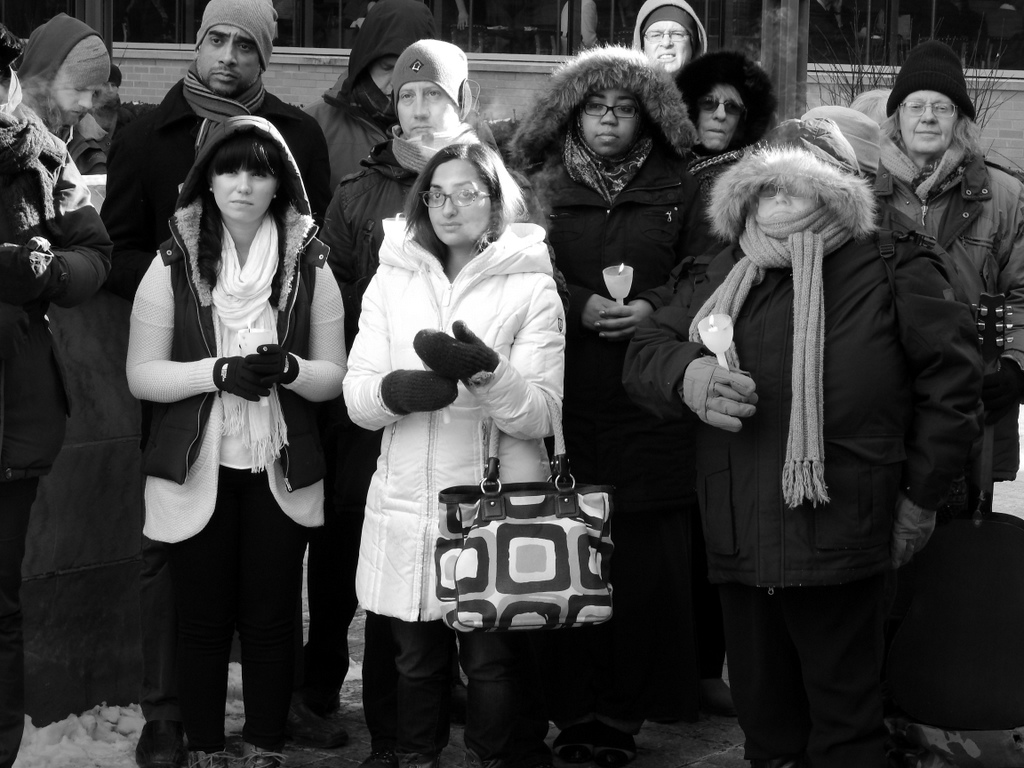A frigid winter morning. In Toronto, -29C with the windchill.
Outside the Church of the Holy Trinity, men and women bundled up in hooded winter parkas and toques, thick scarves wrapped around their necks, were milling about the courtyard behind the Eaton Centre, busy lighting their candles before the start of the monthly homeless memorial vigil.
Click here to see more photos from Tuesday’s memorial.
Tuesday’s memorial attracted an unusually large number of mainstream media.
A week ago, a homeless man was found in a bus shelter at Yonge and Dundas wearing only a T-shirt and jeans. The day before, a homeless man in his 60s was discovered in an abandoned truck in a shipping yard in the west end of the city.
“It’s not okay that people in our communities are dying without a place to call home,” said Greg Cook, an outreach worker at Sanctuary Ministries who coordinates the monthly vigils.
Both deaths made headlines across the country that day, only after the Ontario Coalition Against Poverty (OCAP) and its allies occupied the Mayor’s office and admonished the City for not issuing an extreme cold weather alert that would have set in motion the opening of warming centres.
On the day an alert is called, two 24-hour drop-ins are opened by 3 p.m. Transit tokens are available in drop-ins for people to get to shelters and warming centres and additional shelter beds are opened for men and women.
OCAP’s Gaetan Heroux appeared on national television last Tuesday.
“We’ve had a chronic problem with overcrowding (in shelters) that’s been around for decades, that the city is refusing to address,” Heroux told CTV News Channel.
“Your program of 15 below is not working. You just had two people die on the streets.”
The Medical Officer of Health for the City of Toronto will issue Extreme Cold Weather Alerts when Environment Canada forecasts that temperatures will reach -15C or colder in the city. Unfortunately, the windchill is not taken into consideration.
Since the last vigil in December, four men have died on the streets of Toronto as a direct result of homelessness.
“Does anybody want to say anything about any of these men?” asked Cook.
No one stepped forward, so Cook began to slowly recite the names of all the people who died on the streets of Toronto last year (including several John Does) as a direct result of homelessness, followed by a minute of silence.
“We’ve gathered here far too often over the years to remember today four men who died on the streets and to provide some small measure of respect and dignity in death that was deprived of them in life and to remember the 700 on our list,” said Michael Shapcott, Director of Affordable Housing and Social Innovation at the Wellesley Institute.
“We can start ending homelessness on January 20, the day the 2015 municipal budget comes out and those people are going to be making some very important decisions on our behalf.”
Shapcott was referring to the eight municipal counsellors who attended Tuesday’s memorial.
Last year, the budget for Shelter, Support & Housing was cut $36.5 million dollars from the previous year.
“Largely because the federal and provincial governments have cut funding to the city,” said Shapcott.
“So all of us have to send a message to Queen’s Park and Ottawa that the ongoing cuts have a real impact on the city.”
Last year’s budget set a cap of 3,941 hostel bed nights per night.
“There wasn’t a single day or month last year where there were 3.941 people,” said Shapcott.
“On average it was 4,000, 4,100, 4,200 people in the shelter system. A couple of days ago, 4,228 people.”
But that (budget) was achieved only by digging deeply into reserve funds that are now used up.
“And last year’s budget didn’t allocate any direct city spending on new affordable housing,” he said. “That’s why last year’s budget set a very modest target of 772 new affordable homes for the entire city.”
Meanwhile, 91,809 households (168,972 people) are on the wait list for affordable housing in Toronto.
“So we know that we’re never going to end homelessness if our targets for new affordable housing continue to be low,” said Shapcott.
Then he commended the municipal politicians who attended Tuesday’s memorial to show respect and dignity for those who died on the streets of Toronto.
But Shapcott also reminded them of their responsibility in turning these numbers around by “translating political will into something tangible so that we have a shelter system that actually supports people on a nightly basis so that people aren’t left in the cold.”



